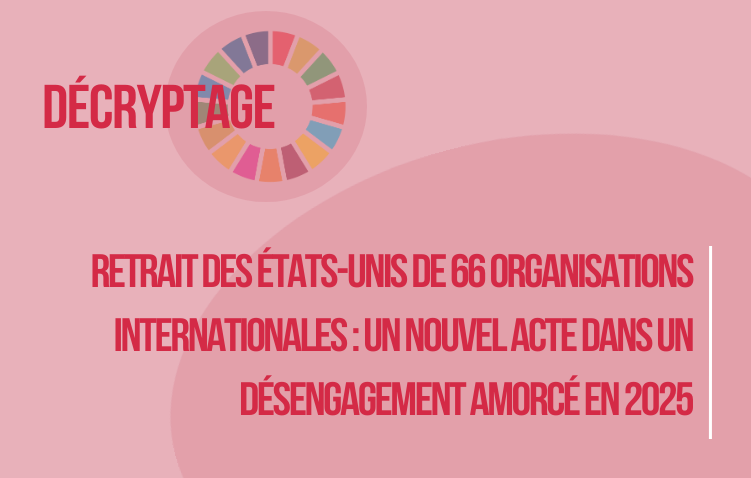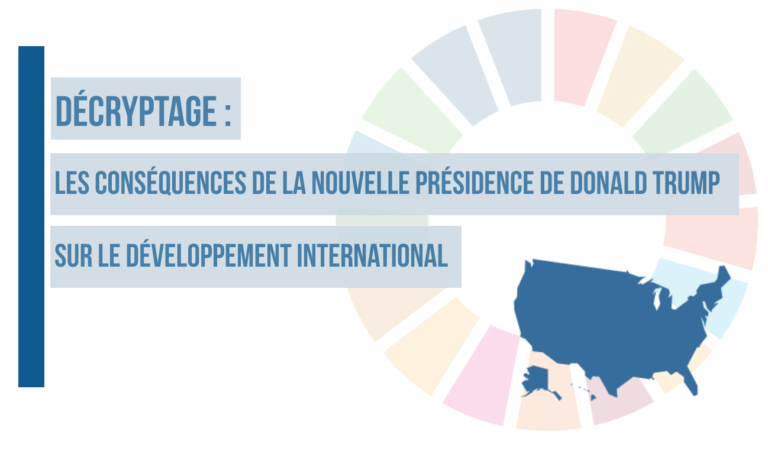3 questions to Neil Datta, Executive Director and Founder, European Parliamentary Forum for Sexual and Reproductive Rights
Publié le 07/03/2025.
| As part of its special edition on the state of inequality in the world in 2025, Focus 2030 wants to put forward the stakeholders who work to help achieve gender equality on a daily basis. |
The European Parliamentary Forum for Sexual and Reproductive Rights a network of Members of Parliament throughout Europe who are committed to protecting the sexual and reproductive rights (SRHR) of all people, both at home and overseas.
Interview with Neil Datta, Executive Director and Founder of the European Parliamentary Forum for Sexual and Reproductive Rights
Focus 2030 : In your 2021 report, “Tip of the Iceberg : Religious Extremist Funders against Human Rights for Sexuality & Reproductive Health in Europe“, you identified $707.2 million have been allocated in anti-gender funding between 2009 and 2018. Could you tell us more about the sources of these funds and the networks behind them ?
Neil Datta : In our 2021 report, “Tip of the Iceberg : Religious Extremist Funders Against Human Rights for Sexuality & Reproductive Health in Europe,” we examined the financial activities of 120 anti-gender organizations operating within Europe from 2009 to 2018. We discovered financial data for only 54 of these organizations, less than half of the total sample. This discrepancy led us to choose the title Tip of the Iceberg, suggesting that the full scope of anti-gender funding remains largely unseen. Nevertheless, the available data provides significant insights into the anti-gender movement.
First, we observed a dramatic increase in funding over the decade. In 2009, anti-gender organizations received an average of USD 20 million per year, a figure that rose to over USD 80 million annually by 2018, marking a quadrupling of funding. A further key finding was the geographic distribution of this funding. Approximately 12% of the financial support originated from the United States, 25% from the Russian Federation, and 66% from Europe itself.
Upon closer examination, we found that U.S. anti-gender funding was concentrated within a few prominent organizations, notably the Alliance Defending Freedom (ADF) and the European Center for Law and Justice. These groups specialize in litigation and have brought their extensive experience in U.S. legal battles to the European context. For instance, ADF played a pivotal role in the legal efforts that culminated in the overturning of Roe v. Wade in 2022.
Russian funding was primarily sourced from two far-right oligarchs, Vladimir Yakunin and Konstantin Malofeev, both of whom are currently under Western sanctions for their involvement in the Russian aggression against Ukraine. These figures have created what scholars describe as “influence factories,” which aim to shape Western political, social, and economic elites in favor of a pro-Russian agenda. These efforts position Russia as a defender of “authentic European Christian values.”
European funding sources primarily consisted of wealthy individuals, including industry leaders, billionaires, and aristocratic families, who form a significant part of the financial infrastructure supporting anti-gender initiatives. Additionally, we noted the rise of crowdfunding platforms developed by anti-gender organizations, which allow them to solicit funds directly from their supporters.
With this USD 707 million, religious extremists have been able to build five new pan-European lobbying infrastructures : one focused on anti-abortion advocacy ; another on promoting homophobia ; a third dedicated to creating a pan-European ultra-conservative Christian political party ; a fourth aimed at expanding a pseudo-Catholic, cult-like network ; and a fifth involved in the development of a global social media petition platform to facilitate ultra-conservative online harassment. Together, these efforts exemplify the transnationalization of the anti-gender movement, which has not only enhanced its professional capacity but also cultivated a new generation of younger leaders.
We are currently in the process of updating this research and expect to release a new report in May 2025, entitled “The Next Wave : Religious Extremist Funding in Europe.” Preliminary findings suggest that funding levels between 2018 and 2022 have more than doubled compared to the previous period.
Focus 2030 : The European Parliamentary Forum for Sexual & Reproductive Rights (EPF) mobilizes a network of parliamentarians across Europe to advance sexual and reproductive health and rights (SRHR). What concrete actions can parliamentarians take to support women’s rights and their bodily autonomy ?
Neil Datta : Parliamentarians play a crucial role in advancing SRHR by leveraging their constitutional mandates : enacting and monitoring laws and policies, holding governments accountable for commitments, and ensuring adequate funding for implementation. Across these three areas, decisive action is required to strengthen women’s rights and bodily autonomy.
Strengthening Laws and Policies : Despite progress in gender equality, fundamental rights such as access to abortion remain precarious. In many countries, legal protections for abortion rights are inconsistent, often subject to political shifts that can erode hard-won gains. Parliamentarians must work to enshrine these rights in national legislation, ensuring that abortion is legally protected, accessible, and free from unnecessary restrictions. Furthermore, while contraception is widely recognized as essential for reproductive autonomy, significant gaps remain in affordability, availability, and public awareness. Strengthening laws to guarantee universal access to modern contraception, including emergency contraception, is essential. Policymakers should also advocate for comprehensive sexuality education, empowering individuals with knowledge to make informed reproductive choices.
It is for this reason that EPF has produced a series of policies atlases covering abortion, contraception, HPV prevention and fertility treatments to highlight the disparities between countries and pointing to good practices parliamentarians can adopt from comparable countries. This approach has contributed to over 15 positive changes in abortion laws across Europe and over 25 policy changes on access to contraception ranging in countries as far apart as Argentina, Mexico, Oman, and over 15 European countries.
Holding Governments Accountable : Governments frequently fall behind on their commitments to SRHR, despite international agreements such as the Sustainable Development Goals (SDGs) 2030 and commitments made at forums like the G. Parliamentarians must rigorously monitor national progress, challenge delays, and push for stronger implementation mechanisms. Additionally, many governments are downsizing official development assistance (ODA) for global health and gender equality programs. This rollback disproportionately affects marginalized communities, reducing access to vital reproductive health services. Parliamentarians should use their oversight powers to demand transparency in aid commitments and prevent further cuts to critical SRHR programs.
Ensuring Adequate Funding : A well-funded SRHR framework is essential for meaningful progress. However, global funding trends indicate stagnation or reduction in SRHR investments. Governments must massively increase financial commitments to reproductive healthcare, ensuring that services are available, high-quality, and accessible to all. The notion that defense spending takes precedence over healthcare and social services is a false economy—sustainable security is rooted in health, education, and gender equality. The COVID-19 pandemic underscored the vulnerabilities in global health systems and demonstrated the necessity of robust public health infrastructure. Investing in SRHR is not only a human rights imperative but also an economic and public health necessity.
Parliamentarians must take decisive action to reinforce legal protections, hold governments accountable, and secure the necessary funding for SRHR. Women’s rights and bodily autonomy are fundamental to democracy, equality, and sustainable development. Strengthening legal frameworks, ensuring policy commitments are met, and prioritizing SRHR funding will contribute to a more just and equitable world where all individuals have the right to make informed choices about their reproductive health. The path forward requires unwavering political will, sustained advocacy, and a commitment to protecting and expanding SRHR globally.
Focus 2030 : With the United States rejoining the Geneva Consensus and conservative countries gaining ground across Europe, what do you foresee for the future of SRHR and gender equality policies in the coming years ? What strategies should be prioritized to safeguard and advance these rights in this shifting political landscape ?
Neil Datta : With President Donald Trump’s inauguration, the global landscape for SRHR, gender equality and human rights is entering uncharted territory. Within weeks, the U.S. rejoined the Geneva Consensus Declaration—an unofficial document denying abortion as a human right—while defunding the UNFPA and SRHR civil society organizations. Efforts to dismantle the USAID, the world’s largest development agency, signaled a broader retreat from global development commitments.
Our recent report, Beyond the Chaos : Making Sense of the Trump Administration’s Impact on SRHR and Gender Equality, identifies three phases in this shift : destruction, consolidation, and creation.
- Destruction Phase : This phase entails halting funding and withdrawing from institutions like the WHO and UNHRC, undermining global commitments to SRHR and even the overall SDG Agenda 2030 framework.
- Consolidation Phase : The administration advances anti-gender diplomacy through the Geneva Consensus Declaration and reframes religious freedom as a superior right, potentially limiting healthcare access and anti-discrimination protections. Vice President J.D. Vance has championed this shift. Another concern is demography, with figures like Elon Musk warning of population collapse. Collaborations with anti-gender actors such as former Hungarian President Katalin Novák and Italian Prime Minister Giorgia Meloni have resulted in the launch of WY Worldwide.
- Creation Phase : This phase involves replacing evidence-based SRHR policies with ideological alternative “anti-gender services”. For instance, natural family planning may be promoted over modern contraception, crisis pregnancy centres over abortion access, and abstinence-only education over comprehensive sexuality education. Programmes like Protego : The Woman’s Optimal Health Framework—developed by the same actors behind the Geneva Consensus—provide the infrastructure for these shifts.
Strategic Responses
To counter these developments, we propose a five-step approach :
- Discovery – Invest intellectual and financial resources into understanding the anti-gender movement.
- Disarm – Investigate networks and strategies to enable targeted responses.
- Dislocate – Remove anti-gender actors from power or build coalitions to neutralize their influence.
- Demonetize – Disrupt funding sources, particularly public funding sustaining anti-gender initiatives.
- Defend – Strengthen legal frameworks for SRHR and protect frontline advocates and workers from systemic marginalization.
This moment demands vigilance, resilience, and unwavering commitment. Beyond resisting regressive policies, a coordinated effort is necessary to reinforce democratic norms and safeguard decades of progress in SRHR and gender equality. The path forward requires proactive engagement, ensuring that human rights remain central to global policy. Only through sustained advocacy and coalition-building can the threats posed by the anti-gender movement be effectively countered, securing a future where reproductive rights and gender equality are protected. Every effort must be made to dismantle structural barriers, challenge misinformation, and hold policymakers accountable for ensuring rights-based policies. Strengthening legal protections, amplifying marginalized voices, and fostering international cooperation will be crucial in this effort. The stakes are high, and failure to act risks reversing hard-won gains. By adopting a multi-pronged strategy, we can ensure that the global community continues progressing toward gender justice and reproductive freedom.
NB : The opinions expressed in this interview do not necessarily reflect the ideas of Focus 2030.











